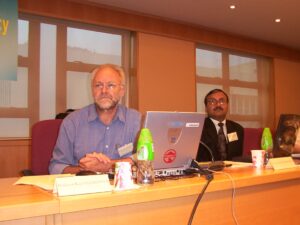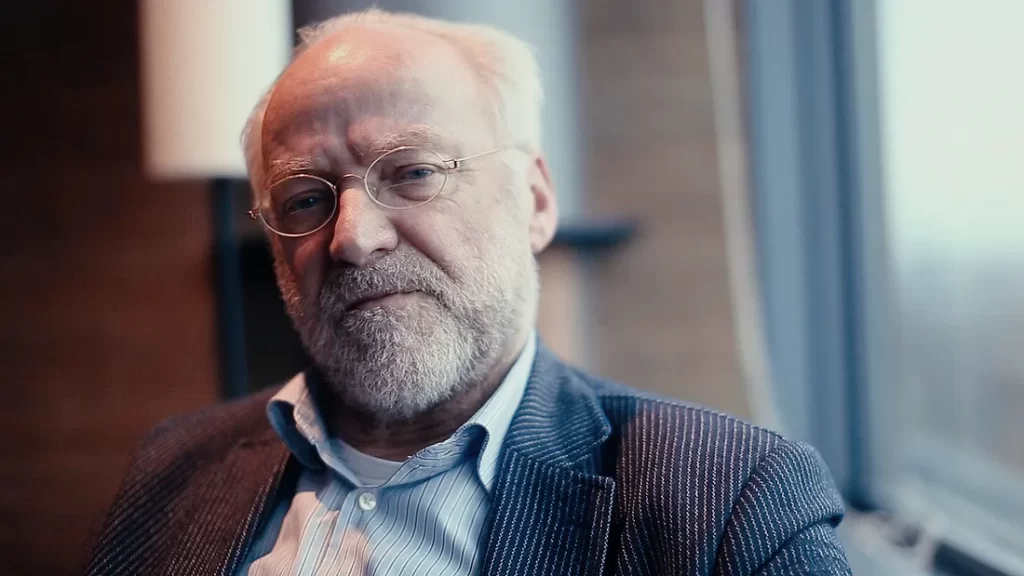While I was on my way to the Delhi International Airport to take a flight to Kochi in the early morning, I read the shocking news through a social media post –
“Dear followers,
I passed away on December the 9th. Dutch euthanasia law allowed me to skip the last phase of incurable multiple myeloma disease. I have enjoyed life.
My main intellectual legacy is the World Database of Happiness, The last version will be stored in the Library of Erasmus University Rotterdam and remains accessible on the internet. You can build on this source for the accumulation of knowledge on happiness or use the technique of a findings archive for another subject.”
I shared this with my wife, recounting my interactions, life lessons, and learnings from Professor Ruut Veenhoven. Throughout our week-long family vacation at the Lakshwadeep Islands, the thought of this noble scholar—who chose to end his life with dignity—remained with me. It brought back vivid memories of our meetings, insightful email exchanges we had, and the common academic interests we pursued. It stayed on my to-do list for a few days to pen this tribute to a remarkable soul.
Here it is.
My first encounter with him was about two decades ago, at an invited international conference organized by the Institute of Humanities and Social Sciences at Lingnan University, Hong Kong, on the theme of ‘Progress, Happiness, and Public Policy.’ The conference provided an excellent platform to share my experiences with Bhutan’s initiatives on happiness and public policy.

Sharing the dais with Professor Ruut Veenhoven, a renowned sociologist devoted to building an academic reservoir in the domain of happiness and well-being, was a distinct honour. Listening to his presentations, enriched with a masterful command over data and cross-national comparisons, was an unforgettable experience.
During our stay at the university guest house, we shared long conversations and explored the vibrant city of Hong Kong together over two remarkable days. During our strolls through the town, we exchanged perspectives on a variety of indicators of well-being and happiness, Bhutan’s unique experiments, Europe’s experiences, and the academic challenges inherent to institutional politics.
Ruut (as he was popularly known) shared his personal journey with me and an important anecdote that has stayed with me to date is about the challenges he faced in initiating happiness studies (World Database of Happiness – WDH) at Erasmus University. He recounted how the resistance from certain quarters of academia was mitigated by the unexpected support of one of his friends in a leading position of a multinational company, who recognized the practical relevance of his work. This episode not only highlighted his resilience but also his ability to build bridges between academia and other sectors—a skill that undoubtedly contributed to the widespread impact of his research.
WDH was a testament to his vision and determination, as few could have foreseen how this one-stop, richly stocked and curated database would become such an invaluable resource for scholars, students, and policymakers across the globe. This unique repository, which systematically compiles and analyzes data on happiness across nations, remains a cornerstone for researchers and policymakers. His farsightedness continues to inspire us all. We at HappLab owe a lot to him and the WDH.
His humility, intellectual curiosity, and warmth left an indelible impression on me. These interactions marked the beginning of a professional and personal connection that flourished over the years as we exchanged ideas, collaborated, and met at various conferences, particularly those organized by the International Society for Quality-of-Life Studies (ISQOLS).
Prof. Veenhoven’s journey into the realm of happiness studies was anything but conventional. As a sociologist, his early academic career was deeply influenced by his commitment to unravelling social conditions contributing to human happiness. In a time when discussions of happiness were often relegated to the domains of philosophy or self-help, he sought to elevate it to the level of rigorous scientific inquiry.
His research provided empirical evidence that societal factors, such as income inequality, governance quality, and access to education, play critical roles in shaping the happiness of individuals and communities. This paradigm-shifting perspective underscored the importance of public policy in fostering environments conducive to well-being.
I greatly benefitted from his idea of measuring “Happy Life Years,” which I incorporated in one of my follow-up studies carried out in Bhutan in 2005-06 and 2010-11, based on his suggestion. This metric combines life expectancy with subjective happiness scores to provide a holistic measure of well-being. This innovative approach offered a nuanced alternative to traditional economic indicators like GDP, reshaping global discourses on development and progress.
Despite his towering academic stature, he was always approachable and eager to engage with scholars at all levels. His guidance and constructive feedback on my own work were invaluable, and I remain deeply grateful for his willingness to share his insights and encourage my pursuits in the field of happiness and well-being. He exemplified the ideal of a mentor—one who empowers others to realize their potential while remaining open to learning from them.
The practical implications of his work have been profound. By emphasizing the importance of measuring happiness and incorporating well-being metrics into public policy, he influenced governments, NGOs, and international organizations. His research provided the empirical foundation for initiatives aimed at improving quality of life, from urban planning and education reform to healthcare policies and social welfare programs.
Notably, his insights into the determinants of happiness in nations have inspired a new generation of researchers and policymakers to prioritize well-being over purely economic growth. His work demonstrated that investing in social capital—through trust-building, equitable resource distribution, and community engagement—yields dividends not only in terms of happiness but also in fostering more cohesive and resilient societies.
For those of us who had the privilege of knowing Ruut Veenhoven personally, his passing is not merely an academic loss but a deeply personal one. He was a scholar who lived his values, embodying the principles of happiness, kindness, and intellectual curiosity that he so passionately studied. Whether it was during a conference discussion, a shared meal, or an impromptu city exploration, his presence was always enriching and inspiring.
As I reflect on our shared experiences, from the vibrant streets of Hong Kong to the stimulating sessions at ISQOLS conferences, I am struck by the depth of his commitment to making the world a better place. Once, after attending the conference, we were returning to our hotels and boarded a metro train (U-Bahn). I occupied a seat but soon noticed Ruut and his wife standing nearby. Out of respect, I stood up and offered him my seat, as is customary in Delhi. However, he politely refused and encouraged me to remain seated. Unable to accept his refusal, I chose to stand alongside him. His humility, humor, and humanity were as integral to his legacy as his academic achievements. His inquisitive eyes and smiling face had such a charm that drove a person to initiate a conversation with him.
ISQOLS had its annual conference in 2023 in Erasmus. Everything was done, the university here had sanctioned the travel support and other related expenses and I was looking forward sharing my recent work with him and learning from meeting him. That was not to happen. My visa arrived on the first day of the conference and I had to cancel the visit. Perhaps that could have been my last meeting him in person.
His contributions to the study of happiness have laid a robust foundation for future research and action. The WDH remains a vital resource, and his pioneering methodologies will continue to guide inquiries into the complex interplay of social, psychological, and economic factors that shape human happiness. Apart from many other initiatives, he shall be remembered for being one of the founding members of the Erasmus Happiness Economics Research Organisation and one of the founding editors of the Journal of Happiness Studies.
While I was pursuing LL B in my college days, I participated in a national debate competition in one of the universities in Haryana, representing my university. The proposed motion was – In the opinion of the house, right to life (Article 21 of the Indian constitution) includes right to end one’s life. That had given me an opportunity to study, explore, and articulate the idea to defend the choice of ending one’s life. After around four decades, here I am, seeing an accomplished scholar making that choice, though as per Dutch euthanasia law. Isn’t it a happy choice?
The words in his social media post (as mentioned at the beginning of this tribute) encapsulate his lifelong ethos: a commitment to autonomy, dignity, and rationality. His decision to utilize the provisions of the Dutch euthanasia law is a testament to his belief in the right to make choices that preserve one’s quality of life—a principle that aligns seamlessly with his academic focus on well-being.
In celebrating the life and legacy of Professor Ruut Veenhoven, we honour not only his immense academic contributions but also the values he embodied: intellectual rigor, compassion, and a relentless pursuit of knowledge that serves humanity. His life’s work reminds us that happiness is not a trivial pursuit but a profound and essential endeavor that touches every aspect of our existence.
As we bid farewell to this extraordinary scholar and human being, let us carry forward his vision of a world where happiness is not only measured but also cherished and nurtured. Rest in peace, dear Ruut. Your legacy will continue to illuminate the path toward a happier, more compassionate world.

4 thoughts on “IN PRAISE OF RUUT VEENHOVEN (1942-2024)”
Vijay you have reduced the essence of the subject in such a wonderful manner, though in the mentioned debate I had not supported the motion, now after about four decades of life I also have different opinion on the issue, but only in such cases. RIP Prof Ruut.
A befitting tribute to a great scholar. Thank you for sharing your personal experiences with him
Very well written. This extraordinary scholar had carved out a replicable methodology for identifying the factors determining the QOL. Vijay has been fortunate to imbibe these nuances from him.
A befitting tribute to a great human being who devoted his life for making the world a happy place to live.